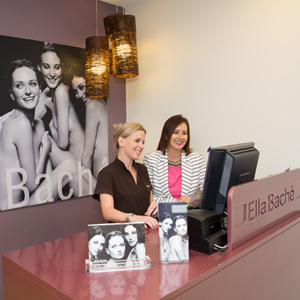
Over the last 10 years Ella Bache franchisees Graham and Ann Thatcher have built a thriving business together.
The pair have been met with, and overcome, their fair share of challenges, and along the way they’ve learned what it takes to be successful in franchising.
CHALLENGES: INITIAL AND ONGOING
Given their prior experience Graham and Ann were confident they would be able to operate a small business.
“We went in thinking we would be able to do it quite easily because of our backgrounds, and I guess from a business perspective we do come with a lot of experience, but the beauty industry itself comes with its own challenges, so in the early days we had to work out how to manage those challenges,” Graham explains.
“We had to learn to surround ourselves with good staff, good people and so on.”
Taking on a second salon within 12 months of opening their first was also quite a test. “You’ve got to take these opportunities when they present themselves, but going into our second salon with less than a year under our belt was challenging and we had to work really hard to make it work,” Graham recalls.
More recently, the couple’s biggest challenges revolve around recruiting and retaining staff, as well as penalty rates. “The way the new modern Award works is very much in favour of the employee, especially around penalty rates,” Graham says.
“We have to have the correct amount of girls on to service the clients that we are going to have in, which means we need to predict how busy we are going to be on a particular day to ensure we don’t have somebody getting paid double time on a Sunday where there are no clients booked,” adds Ann.
The pair recognises a good, solid team of employees is key to their business’s success, and they strive to accommodate the needs of each and every one of their staff members.
“Keeping the girls happy is our job; we really need to make sure that we are switched on with our girls to see where they want to go with their careers and whether we can accommodate that within our business. From our perspective, with five salons and over 40 staff there is always going to be an opportunity for somebody that wants to achieve great things,” Ann says.
“We really need to make sure that we are listening to what they need and we try to ensure that they are given consistent rosters.”
TIPS FOR ACHIEVING SUCCESS IN FRANCHISING
You need to have passion
Passion for the business is a must, Graham says. “It’s the first and most important thing.”
Ensure you’ve got the right skill set
He says business experience is also desirable. “People really need to have some business background and training in how to manage the business’s accounts, books, profit and loss statements and that sort of thing.
“Often people get really enthusiastic about starting their own business but I think it often falls down because they don’t have the experience or the skills to manage the admin side of things.”
Take a step back
While he recognises it’s a clich_, Graham believes it is vital franchisees work on the business rather than work in it day in, day out.
“You’ve got to be able to give yourself enough time to think about strategy and where your business is going – if you don’t have that opportunity then all you are doing is looking after one customer at a time.
“Because Ann and I are both in our business it gives us the opportunity to do both – one of us can strategise while the other one is hands on,” he explains.
Choose the right partner
While franchise partnerships aren’t for everyone, and not all husband and wife teams work when it comes to business, Graham and Ann attribute the business’s success to their partnership.
“I think about the business from a customer point of view whereas Graham thinks about it from a numbers point of view, so we work together to ensure that what we are trying to achieve in our targets isn’t going to disadvantage our clients in any way.
“It’s about keeping the service levels up and being one step ahead of our competitors all the while trying to make the numbers work, where we put a great treatment together and the return on investment (ROI) is where it needs to be,” Ann explains.
“A lot of our success is based on the fact that we are working together,” Graham adds.

